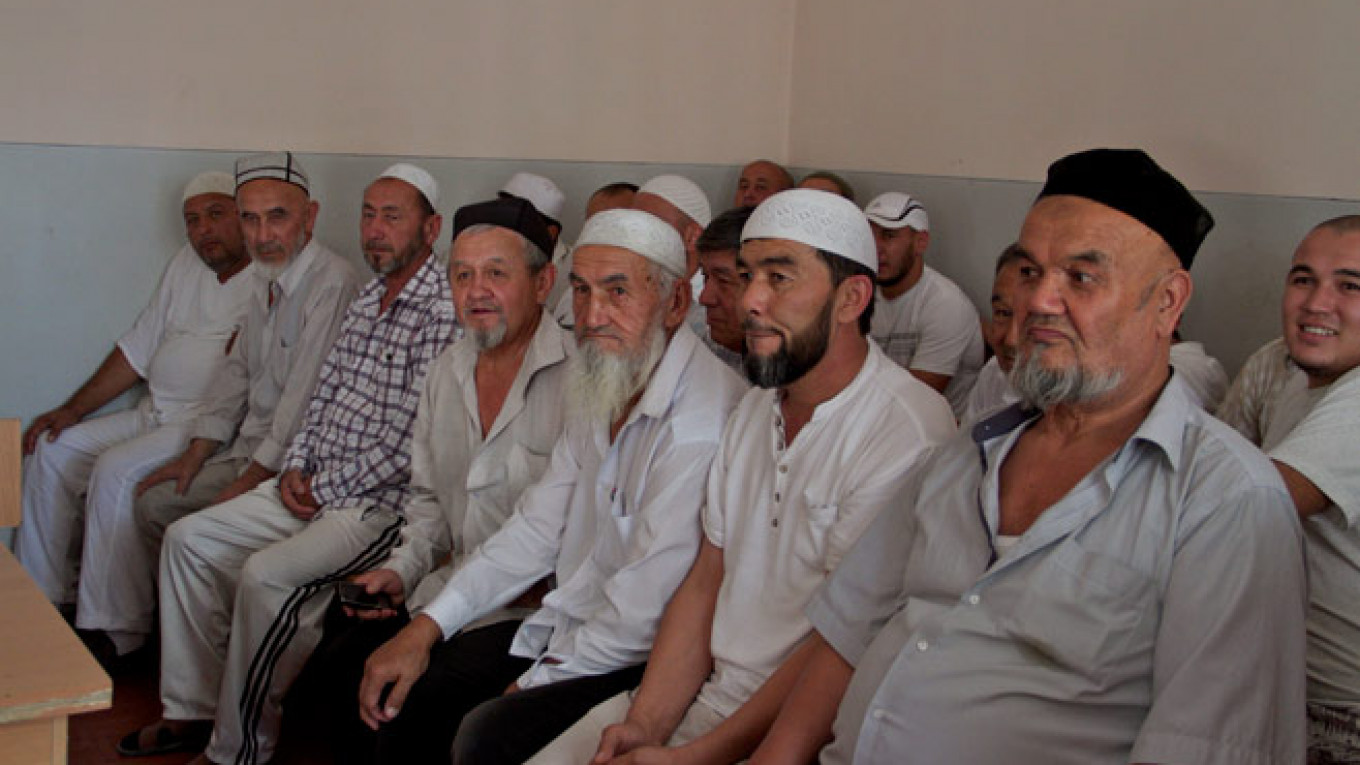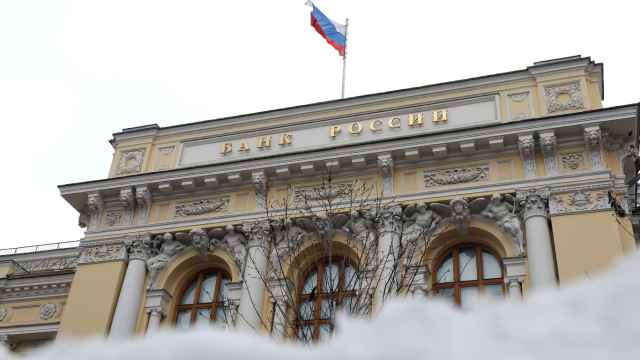Imam Rashod Kamalov seemed calm and composed, sitting behind the bars in a courtroom cage of a district court of Kara Suu — a town in the Osh region of southern Kyrgyzstan. He smiled and shook hands with his supporters, who arrived in their droves to witness the trial of their spiritual leader.
The atmosphere in the courtroom was oppressive, with journalists and the imam's supporters trying to squeeze onto small benches in the back of the room. Many of those present wore loose white shirts and square dark blue hats — typical for the local Uzbek minority, of which Kamalov is a member.
This is the first high-profile case in which an influential Muslim leader has been targeted in an attempt to crack down on independent religious voices.
Rashod Kamalov, a popular 37-year-old imam of the As-Sarakhsiy Mosque, was arrested on Feb. 11 by an anti-terrorist brigade, based on charges that he made extremist statements about the war in Syria and the establishment of a caliphate.
The sole evidence against the imam is a 17-minute video of his sermon given on July 24 last year titled "About the Caliphate." Cut by the prosecution to a mere 3 minutes, the video shows the imam explaining the concept of caliphate, stating that "those who say that there will be no caliphate shall be cast out of the religion. We must bow before those that created the caliphate."
According to the defense, the seemingly controversial statement refers to the canonical interpretation of the Quran and the return of the caliphate after the Day of Judgement, which, it claims, is accepted by the mainstream Hanafi school dominant in Kyrgyzstan.
The local Uzbek minority, journalists and the imam's supporters see the case as politically motivated. As explained by a local journalist, the problem started during a meeting between religious leaders and the police, held in December 2014, to discuss the growing problem of religious extremism in the area, in which the imam spoke out against the corruption of the local security services and the police.
He claimed that some of the officials have used their position to make private financial gains and that it is the lack of trust in law enforcement bodies that pushes people to join the Islamic State, seen by many as an embodiment of a just society governed by Sharia law.
The imam's subsequent arrest is seen as the revenge of the local authorities. As explained by the defense lawyer, Khusunbai Saliev: "From the point of view of the law, the case is absurd." The court refused to accept the expertise presented by the defense and the lack of adherence to official rules have turned the trial into a farce.
"The State Commission for Religious Affairs' expert, who labelled the video extremist, is an Arabic language teacher who testified that Kamalov doesn't criticize the Islamic State enough and then that he supports it. His testimony is therefore self-contradictory." Adding to the paradox, Kamalov's sermon was given in Uzbek, a language from the Turkic linguistic group.
Furthermore, according to Kyrgyz law, it is the court that determines whether or not material is extremist. After such a decision is made, the material must be incorporated in the special register. None of those steps have been followed in Kamalov's case.
According to Saliev, the reason for such an unprecedented attack on a high-profile religious leader is threefold: first, it is revenge for Kamalov's statement accusing the local police of corruption.
Second, it can be explained as a part of the long-established discrimination against ethnic Uzbeks in the south of the country.
Finally, faced by a perceived growing radicalization among Kyrgyz youth, the authorities need a success story to show that they are fighting against extremism.
According to International Crisis Group estimates, about 500 people from the Osh area have left the country to support the Islamic State. In order to address the problem, and as a result of the growing pressure from other regional powers to fight fundamentalism, namely Russia and Uzbekistan, the Kyrgyz government has been targeting those religious movements, who diverge from the officially embraced version of Islam.
The official version promotes a Turkish-style relationship between the state and religion, with a strong emphasis on secularism. Hence the promotion of Sufi literature and the encouragement of study trips and exchange programs with countries such as Turkey, Malaysia and Indonesia, which have been popular among Kyrgyz youth since the collapse of the Soviet Union.
The state-promoted Islam draws in part on pre-Islamic traditions. Addressing the spirits of ancestors or Manas — the country's mythical founder in prayers, a feature absent in more orthodox versions of Islam —has roots in shamanic rituals.
Given the nomadic lifestyle of the Kyrgyz, the practice of attending mosque on Fridays was not widely adopted, and beards and hijabs were considered foreign and viewed with suspicion.
This has now changed, as even the traditionally nomadic north has faced an increase in religiosity among the local youth — most notably in the Issyk-Kul and Narin regions. The growth in religious consciousness since the late 1980s as a general trend was connected with a reconstruction of Kyrgyz ethnic and cultural identity after the collapse of the Soviet Union.
However, according to the survey conducted by John Heathershaw and David W. Montgomery in November 2014, the increased interest in religion has not necessarily been accompanied by the growth in extremism.
The government's response to a growing religiosity has therefore been disproportionately harsh. The 2009 Law on Religion banned private religious education, the wearing of headscarves in schools and it made all unregistered faith groups illegal with a view to extending its control over such communities.
In its attempts to fight extremism, the government has also banned Hizb ut-Tahrir, an Islamist political party with a large membership among the Uzbek minority in the south of the country, whose aim has been the establishment of a caliphate.
With its main headquarters and a publishing house in London, the group officially rejects violence and there is no evidence to suggest that it has been involved in any terrorist activities in the region. In addition, according to various reports, the group does not support the actions of the Islamic State.
Nevertheless, labelled extremist, group members have been a target of local security services, especially in the south of the country, which has traditionally been more religious given the presence of a large Uzbek minority.
The north-south division in Kyrgyzstan is long established, with the northern part seen as "pure" Kyrgyz, originating from the Yenisey area, and the south facing tensions between the traditionally nomadic Kyrgyz and the settled Uzbeks.
Since violent clashes in the area in 2010, the Uzbeks have been facing increased discrimination, with the closure of independent Uzbek media, continuous persecution of the remaining publications, and the destruction or seizure of many Uzbek businesses.
Although the right to receive education in the Uzbek language persists, students can no longer pass exams in their native language and there has been a noticeable decrease in the number of Uzbeks finishing secondary education in the country.
Increased discrimination and the social exclusion of the Uzbek minority, coupled with poor religious education, has been a primary motive for Kyrgyz citizens joining the Islamic State, as explained by a recent policy paper from the Polish Institute of International Affairs.
Despite Uzbeks being the main ethnic group joining the Islamic State, there is a growing number of Kyrgyz leaving for Syria. According to professor Tatyana Dronzina, an expert in terrorism studies, "Radical groups will grow on the soil of political alienation, corruption, lack of respect to human rights and the restriction of civil liberties."
Interestingly, many of those who decide to join the Islamic State become radicalized in Russia, where a number of Kyrgyz citizens have moved in search of employment. Facing discrimination and being removed from their traditional social environment, many migrants experience the feeling of isolation.
They often join their countrymen in mosques where they are exposed to radical ideas. As many of them lack proper religious education, they can be easily manipulated and exploited by radical groups.
However, while the process of radicalization clearly exists and should be addressed by the government, the policy paper by the Polish Institute of International Affairs suggests that the number of fighters in Central Asia is still lower than those of Europe or the countries of the Middle East and North Africa.
The Kyrgyz state's harsh response to growing religiosity most likely will not contribute to a decrease in the number of Kyrgyz citizens joining the Islamic State. On the contrary, the oppressive and discriminatory treatment of the Uzbek minority will fuel resentment within the community and swell the number of fighters in the ranks of the Islamic State.
The state, instead of working with religious leaders such as Kamalov to prevent the radicalization of Kyrgyz youth, and especially the Uzbek minority, has done all it can to further alienate the community. It remains to be seen how the Kamalov case will be resolved, but the defense has little hope for a positive outcome.
Agnieszka Pikulicka-Wilczewska is blogs editor at E-International Relations and co-editor of Ukraine and Russia: People, Politics, Propaganda and Perspectives.
A Message from The Moscow Times:
Dear readers,
We are facing unprecedented challenges. Russia's Prosecutor General's Office has designated The Moscow Times as an "undesirable" organization, criminalizing our work and putting our staff at risk of prosecution. This follows our earlier unjust labeling as a "foreign agent."
These actions are direct attempts to silence independent journalism in Russia. The authorities claim our work "discredits the decisions of the Russian leadership." We see things differently: we strive to provide accurate, unbiased reporting on Russia.
We, the journalists of The Moscow Times, refuse to be silenced. But to continue our work, we need your help.
Your support, no matter how small, makes a world of difference. If you can, please support us monthly starting from just $2. It's quick to set up, and every contribution makes a significant impact.
By supporting The Moscow Times, you're defending open, independent journalism in the face of repression. Thank you for standing with us.
Remind me later.






